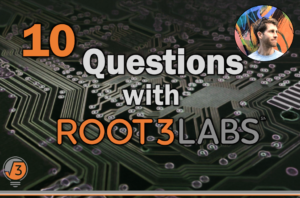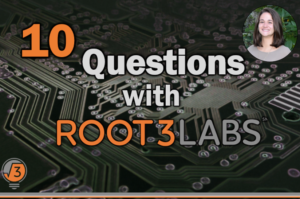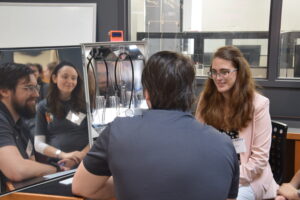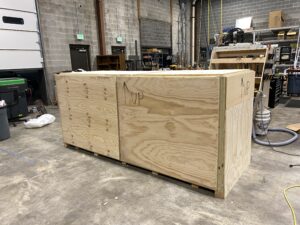Welcome to ’10 Questions with Root3 Labs’, a Root3 series where we take some time and give the spotlight to one of our team members to share a little about themselves, their work, and a little advice for other engineers. The very first edition features Innovation Strategist and Sr. Mechanical Engineer Todd Murphy.
Driven by an interest in social connections, Todd’s career has taken him around the country and the world. He studied mechanical engineering at Rensselaer Polytechnic Institute (B.S.) and Johns Hopkins University (M.S.), where his research on surgical skill evaluation led him to the medical technology industry. He held positions at several medical device companies focused on interventional catheters and tools for robotic surgery. Then a unique opportunity came up for Todd and his wife to join a social enterprise in Myanmar, where Todd led the manufacturing operations making irrigation equipment specifically designed for low-income farmers. He returned to the US to join the Stanford Biodesign fellowship, out of which he co-founded Tueo Health, a digital health company for asthma management, and also enjoyed a stint as a product manager at one of Silicon Valley’s tech giants. Todd loves to get dirty with numbers and tools but is always focused on the people at the interface with technology and the context of what he’s working on.
Mr. Murphy…
1. What led you to this career?
I always liked building things and had an affinity for math and science. I’ve also always been a pretty practical, utilitarian person and as a high schooler, I thought, “the point of college is to learn some skills for a job” and engineering seemed like an obvious pathway. What’s kept me in the profession has been the desire and opportunity to work on things which have improved health and livelihood for others.
2. What’s one professional skill you’re currently working on?
Project management. I want to get beyond just good communication and tracking of progress and get to a place that I can really help our clients work through all the ambiguity and management challenges that are often associated with new product development.
3. If you could only have three apps on your smartphone, which would you pick?
Messages (for staying in touch with anyone anytime anywhere), Google Maps (I’ll never be lost again!), Strava (cycling is my biggest hobby and I love to track my rides). I do spend a lot of time on social media too, but in the end you just can’t beat the kind of capability offered by these tools that simply didn’t exist not that long ago.
4. What do you want to be remembered for?
Caring about people: my family, my friends, my fellow humans around the world.
5. Do you see the glass as half empty or half full?
May depend on the day, but mostly I’m a half-full kind of person. We face a lot of challenges in our world today, but many of the trends when it comes to health and livelihood for people around the world are really positive.
6. What’s one thing you’re currently trying to make a habit of?
I’ve been working on two things: 1) achieving the recommended weekly amount of 150 minutes of exercise and 2) reading more books; I start with at least 15 minutes a day and, once I’m doing that instead of staring at my phone, it’s easy to keep going.
7. What upcoming technological innovation do you think will dramatically impact the industry in the next five years?
There’s a huge trend underway to persistently monitor individuals for a growing range of “digital biomarkers” of health and disease; I think this will start to dramatically alter the way we think about and manage a number of chronic diseases.
8. What’s a mistake you made early on in your career, and what did you learn from it?
I once made a mistake in some code that led to a prototype instrument not working properly when a surgeon intended to use it for the first time in a real case. Bugs in code are one thing, but the real underlying mistake was that I didn’t take all of the quality controls that should have prevented this that seriously. As a young engineer, those things seemed like such an annoying burden; this experience helped me to see how they were an embodiment and structure for teamwork and risk mitigation that should be embraced for the sake of high-quality output.
9. Would you rather be able to play 10 different instruments beautifully or speak 10 different languages fluently?
Languages. I lived and worked in Myanmar for four years. I learned some Burmese but also learned just how much language is a tool to understand a culture, so for me, 10 languages would be like 10 portals into different cultures and mindsets and an opportunity for me to learn and grow.
10. Any advice for aspiring engineers?
Embrace what you really learn as an engineering student and the diversity of where that can take you. The education naturally focuses on hard technical skills, but in learning those you are being shaped with an analytical mindset that can be put to work doing lots of things. A rewarding career as an “engineer” can be nuts and bolts or wires and volts, but a foundation of understanding how technologies work and the ability to analyze information can lead to just about anything.
Thank You to Todd Murphy for participating in this month’s ’10 Questions with Root3 Labs’ series and stay tuned for more interviews with other employees with Root3 Labs.





